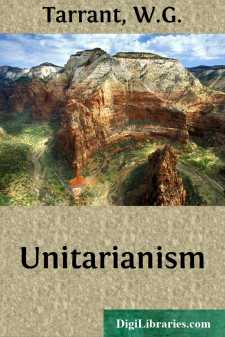Categories
- Antiques & Collectibles 13
- Architecture 36
- Art 48
- Bibles 22
- Biography & Autobiography 813
- Body, Mind & Spirit 142
- Business & Economics 28
- Children's Books 17
- Children's Fiction 14
- Computers 4
- Cooking 94
- Crafts & Hobbies 4
- Drama 346
- Education 46
- Family & Relationships 57
- Fiction 11829
- Games 19
- Gardening 17
- Health & Fitness 34
- History 1377
- House & Home 1
- Humor 147
- Juvenile Fiction 1873
- Juvenile Nonfiction 202
- Language Arts & Disciplines 88
- Law 16
- Literary Collections 686
- Literary Criticism 179
- Mathematics 13
- Medical 41
- Music 40
- Nature 179
- Non-Classifiable 1768
- Performing Arts 7
- Periodicals 1453
- Philosophy 64
- Photography 2
- Poetry 896
- Political Science 203
- Psychology 42
- Reference 154
- Religion 513
- Science 126
- Self-Help 84
- Social Science 81
- Sports & Recreation 34
- Study Aids 3
- Technology & Engineering 59
- Transportation 23
- Travel 463
- True Crime 29
Unitarianism
by: W.G. Tarrant
Description:
Excerpt
I. THE UNITARIAN MARTYRS
The rise of any considerable body of opinion opposed to the cardinal dogma of orthodoxy was preceded in England by a very strongly marked effort to secure liberty of thought, and a corresponding plea for a broadly comprehensive religious fellowship. The culmination of this effort, is reached, for the period first, to be reviewed, in the writings of John Locke (1632-1704). This celebrated man, by his powerful arguments for religious toleration and his defence of the 'reasonableness' of the Christian religion, exerted an influence of the most important kind. But we must reach him by the path of his predecessors in the same line. The principles of liberty of thought and the broadest religious fellowship are warmly espoused by Unitarians, and they look upon all who have advanced these principles as in spirit related to them, however different their respective theological conclusions may have been.
At the time of the Reformation a great deal of speculation broke forth on points hitherto closed by the Church's authority, including the fundamental doctrine of the Trinity. But, while this new ferment led to departures from the received opinions in many countries, especially in Poland and the Netherlands, the Protestant leaders maintained that upon the great articles of the creeds they were still one with Rome, and in fact they soon displayed an eagerness to stifle heresy. Men often fail to see the logic of their own position, and many who claimed the right to differ from Rome on points which Rome considered vital were unable to grant that others had an equal right to differ from Luther, Calvin, or an English State Church. The outrageous cruelty of Calvin towards the Anti-trinitarian Servetus, whom he caused to be burned at Geneva in 1553, affords a glaring instance of this inconsistency. But a sad proof is given that, about that time, even Anti-trinitarians themselves were not always tolerant.
Among the countries where the orthodox dogma was most freely questioned was Transylvania, adjacent to Hungary proper.
Here the sovereign, John Sigismund, took sides with the Anti-trinitarians, and issued in 1568 an edict permitting four recognized types of doctrine and worship—Romanist, Lutheran, Calvinist, and Unitarian. The Transylvanians were at this time largely under the influence of their Polish brethren in the faith, who still practised the invocation of Christ. Francis David, a powerful religious leader in Hungary, having arrived at a 'Humanitarian' view of Christ two centuries before it was held by English Unitarians, opposed Christ-worship. In 1579, when a Catholic had succeeded to the throne, David was denounced for an intolerable heretic by the Polish party, and, being imprisoned, died the same year. This blot on the record has long been deplored, and David is held in honour as a martyr by the Transylvanian Unitarian Church, which still flourishes, and forms a third member in alliance with the Unitarians of Great Britain and America. As, however, these Transylvanian (popularly called 'Hungarian') Unitarians had until the nineteenth century little or no connection with the English and Americans, and have not materially affected the development of the movement, we omit the details of their special history....


